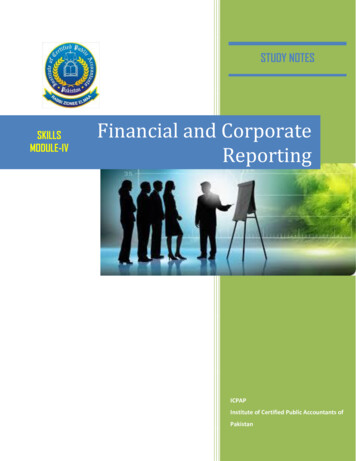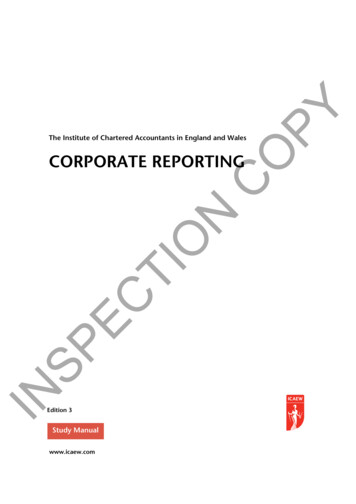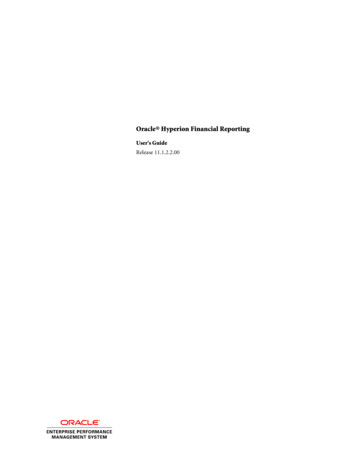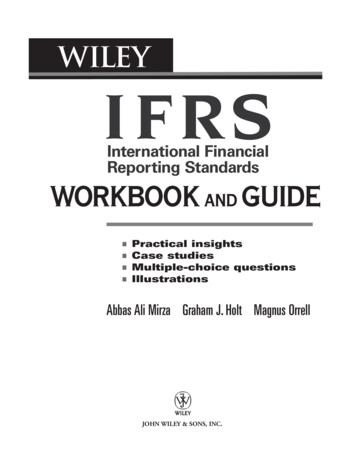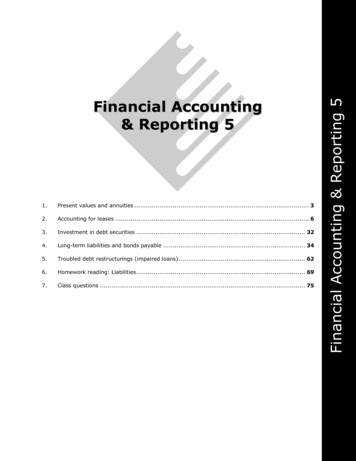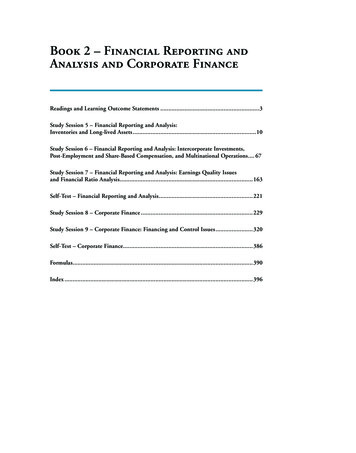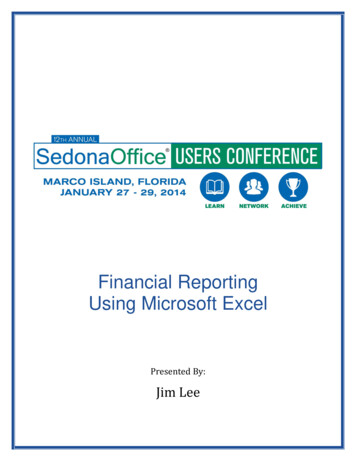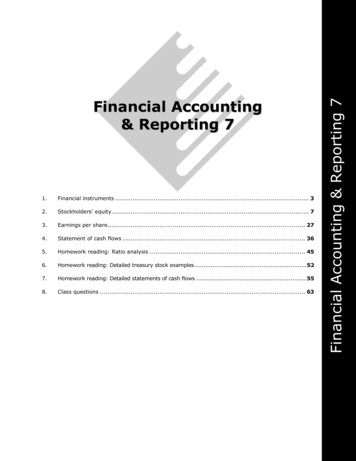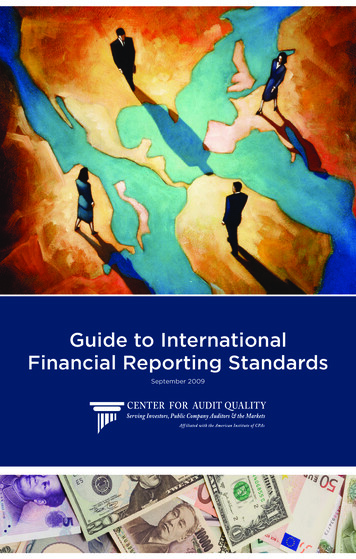
Transcription
Guide to InternationalFinancial Reporting StandardsSeptember 2009
OverviewIn an increasingly interconnected global economy, many market participants areconsidering the question of whether it is possible or desirable to move toward amore uniform global “language” for financial reporting. The proponents of this ideaargue that a uniform set of global accounting standards, supported by strong governance, independent standard-setting and a sound regulatory framework, couldbenefit investors and businesses alike. Others suggest that trying to establish auniform set of global standards would run the risk of overlooking the unique economic, political, cultural, legal and regulatory realities that exist in different nationsand regions.Over the past decade, this global discussion has intensified. In 2001, the International Accounting Standards Board (IASB) adopted the first iteration of InternationalFinancial Reporting Standards (IFRS) to serve as a possible pathway for establishing uniform global accounting standards. Since then, IFRS has been adopted orbecome accepted in over 100 countries. Over this same period, the FinancialAccounting Standards Board (FASB) and the IASB have begun an effort toconverge IFRS and the Generally Accepted Accounting Principles in the UnitedStates (US GAAP), essentially working to make the two sets of accounting standards increasingly similar to each other. More recently, some market participantshave raised the possibility of transitioning entirely from US GAAP to IFRS for publiccompany financial reporting in the United States.In the coming years, critical decisions will need to be made regarding the use ofglobal accounting standards in the United States. Market participants will be calledupon to determine whether achieving a uniform set of high-quality global accounting standards is feasible, what sort of investments would be required to achievethat outcome, and whether it is a desirable goal in the first place. This dialogue willbe critical to the future of financial reporting and of fundamental importance to thelong-term strength and stability of the global capital markets.In that spirit, the Center for Audit Quality (CAQ) has developed this Guide to IFRSto provide interested parties with useful information and to help facilitate an informed public discussion among all those who have a stake in our capital marketssystem.The Evolution of Accounting StandardsAccounting standards around the world have evolved over centuries of businessand capital market development. In this process, accounting standards historicallywere designed to meet the needs of each nation’s capital markets. Those standards that were found to work well in the legal, cultural, political and economiccontext of each nation became the “generally accepted accounting principles,” orGAAP, for that particular jurisdiction. Naturally, different norms in each nation ledto different GAAPs in each nation.The growing dynamic of globalization presented a challenge to these “legacysystems.” Global protocols for the internet, electronic payments, software systems and cargo shipping demonstrated the potential value of uniform globalsystems. A discussion began among market participants over whether the globalcapital markets would similarly benefit by having a single set of high-quality accounting standards that could be applied around the world.In order to create a uniform global system for financial reporting, the IASB wasformed to serve as the global accounting standard-setting body. (See sidebar formore information on the IASB.) In 2001, the IASB promulgated the first iteration ofIFRS, offering the possibility of a single set of high-quality accounting standardsthat could be used by all nations.
The Challenges and Opportunities of IFRSSince 2001, IFRS has become accepted or been adopted for public reportingpurposes in over 100 countries, including the 27 member-states of the EuropeanUnion. Others scheduled to follow in the next few years include Argentina, Brazil,Canada, Chile, India, Korea, Singapore and Mexico. In addition, in June 2009,Japan approved a roadmap for the adoption of IFRS which includes an election forJapanese companies to begin voluntarily using IFRS immediately. (See sidebar forinformation on global market trends.) As more and more countries adopt IFRS, arobust conversation has begun about whether the United States should take thisstep or otherwise participate in a process that leads to the acceptance of moreuniform global accounting standards for use in the U.S.As part of that effort, since 2002, the IASB and the FASB, which sets accountingstandards in the United States, have been engaged in a process aimed at “converging” IFRS and US GAAP. (See sidebar for more information on the FASB.)The goal is that over timethe differences betweenIFRS and US GAAP couldsteadily be diminished andeventually the two sets ofstandards would be essentially, if not completely,identical. While progress hasbeen made to reduce the differences between IFRS andUS GAAP, the speed at whichthat progress has beenmade has been substantiallyslower than originally anticipated. In addition, there aresome who believe that convergence is unlikely to get tothe point where the two setsof standards are truly identical. This view has led someto call for the United Statesto adopt IFRS outright toreplace US GAAP. In thatvein, the U.S. Securities andExchange Commission (SEC)in November 2008 proposeda “Roadmap for the PotentialUse of Financial StatementsPrepared in Accordance withIFRS by U.S. Issuers” (theProposed Roadmap) and solicited public reaction. (Seesidebar for more informationon the Proposed Roadmap.)Global Market TrendsAccounting Standards Used byGlobal Fortune 500 Companies:1US GAAP . . . . . . . 42%IFRS . . . . . . . . . . 32%Japan* . . . . . . . . . 9%Canada* . . . . . . . . 3%Other . . . . . . . . . 14%* Have committed to accepting IFRSGrowth of Listed Companies onExchanges Around the World(2002–2008):2Korea . . . . . . . . 163%India . . . . . . . . . . 53%Singapore . . . . . . 53%China . . . . . . . . . 27%United Kingdom . . . 10%United States . . . . (1)%Percentage of Worldwide MarketCapitalization on Exchanges:2KoreaIndiaSingaporeChinaUnited KingdomUnited States20020.9%0.5%0.4%4.1%8.1%48.2%1 As of 20072 Data derived from World Federationof Exchanges statistics reports20081.4%1.8%0.8%9.3%5.5%34.9%The Proposed Roadmap laid out a process and a set of milestones which, if met,could lead to certain larger public companies in the United States being requiredto begin issuing their financial reports in accordance with IFRS by the year 2014,with smaller public companies adopting IFRS in 2015 and 2016.About the IASBThe IASB is based in London and is overseen by the InternationalAccounting Standards Committee (IASC) Foundation, which is aprivate, not-for-profit corporation. The IASC Foundation is governedby 22 trustees from geographically diverse backgrounds.The IASB is comprised of 15 members from different nations aroundthe world. The current board consists of members from five EUmember-states, China, Japan, Australia, South Africa, Brazil and fiveAmericans. The IASB is funded through national levies as well asvoluntary contributions from around the world, including large international companies, regulators, standard setters and internationalaccounting firms.
ChallengesThere are important considerations that need to be evaluated prior to the potentialadoption of IFRS in the U.S. These include the following: IASB’s Funding, Staffing and GovernanceThe success of IFRS as a high-quality set of global accounting standards dependsupon the IASB functioning as a truly independent standard-setting body thatenjoys the confidence of market participants around the world. To assure thatconfidence, the IASB needs to have a secure, stable funding mechanism, expertstaffing and appropriate governance structure to ensure the standard-settingprocess is free from undue influence from various constituents. To address someof these concerns, in January 2009 the IASC established a monitoring board,made up of representatives from leading securities regulators (including theSEC) to enhance the public accountability of the IASC while at the same timemaintaining the independence of the standard setting process. Consistent Adoption, Application and Regulatory ReviewWhile a significant number of nations have adopted or accepted IFRS, in orderto achieve the true benefits of a uniform set of accounting standards, it isimportant that IFRS is adopted by nations in a manner consistent with thoseissued by the IASB. In addition, it is equally important that they are applied andenforced in a consistent manner. Therefore, there must also be a mechanism toensure that auditing standards and the practices of auditors facilitate consistentapplication of IFRS. Similarly, over time there must be improved coordinationof global regulatory review. Absent those changes, the adoption of IFRS maymean substantial investment, but without realization of all the benefits thatcould be achieved from a more uniform global reporting system. Discontinuing US GAAPEven among those market participants who acknowledge the importance ofestablishing uniform global accounting standards, there are some who are concerned with a transition away from US GAAP because they believe it is the true“gold standard” for financial reporting given its extensive development, understanding and use around the world. Cultural and Structural Changes in the U.S.In order for the United States to successfully transition to IFRS, it will requirea significant effort and investment from virtually all market participants in thecapital markets system. Some of the changes that would be required: Transition to IFRS would increase the need for training and education forinvestors, accountants, auditors and others involved in the preparation anduse of financial statements. This would require, for example, the developmentof curricula on IFRS at the university level, adjustments to the CPA exam toreflect knowledge of IFRS and increased efforts by the accounting professionto expand the ranks of CPAs trained in IFRS; Businesses would need to integrate new software platforms and adjust theirreporting processes to reflect the requirements of IFRS — this includes changes to internal control requirements and data gathering systems that currentlyare designed to meet US GAAP standards; Regulators would need to adjust oversight and disclosure requirements fromthe current system based on US GAAP to new standards based on IFRS andput a new emphasis on international cooperation and coordination; Investors (both individuals and institutions) and lenders would need to become familiar with financial reports prepared in accordance with IFRS. Forexample, lending agreements would need to be modified to allow for andconsider reporting under IFRS; and Members of the United States legal system, including lawyers, judges andlawmakers, would need to work through a variety of tax issues and otherapplications of law.In order to effectively navigate the considerations outlined above, there wouldneed to be a clear national “blueprint” for achieving such a transition. The SEC’sProposed Roadmap provides a meaningful basis to assist in the developmentof such a blueprint. Any plan though, should leverage the experiences of othercountries that have previously undergone a transition to IFRS, would need tospecify the actions that would be required of different capital markets participants, and ideally lay out target dates for the completion of those actions.
OpportunitiesAbout the SEC’s RoadmapIn November 2008, the SEC proposed a “Roadmap for Potential Use ofFinancial Statements Prepared in Accordance with IFRS by U.S. Issuers.”This “roadmap” detailed a plan, with associated milestones and actionitems, by which public companies in the United States could transitionfrom financial reporting based on US GAAP to IFRS beginning in 2014.Under the roadmap, the transition to IFRS would unfold in severalstages, with certain large companies being granted the ability to makethe transition before 2014. In the coming years, a number of milestoneswould need to be achieved in terms of preparing businesses, academicinstitutions, the accounting profession, and legal and regulatory systems for the transition.While the concerns outlined above warrant further consideration, there are anumber of factors that support the idea of adoption or acceptance of IFRS inthe United States: Facilitate More Efficient Capital AllocationsA single set of high-quality global accounting standards would increase theability of companies to raise capital in multiple jurisdictions around the worldwhile at the same time allowing investors to more efficiently compare globalinvestment opportunities. Align the United States with the Rest of the WorldAlready, more than 100 nations have adopted or accepted IFRS, including mostof the world’s developed economies. At this point, it is fair to say that IFRS isbecoming the global norm. If the United States were to adopt IFRS, it wouldbe joining much of the rest of the world, which would provide a powerful pushtoward worldwide acceptance of a single set of global accounting standards. Protect Long-term Competitiveness of U.S. Capital MarketsCross-border investment and the integration of capital markets may be easieramong those nations that adopt IFRS. By choosing not to adopt IFRS, the UnitedStates may run the risk of seeing investors and businesses shift to financial centers in those nations that use IFRS, rather than accept the burden of having tooperate in both IFRS and US GAAP. Promote Increased TransparencyIFRS is a more “principles-based” set of accounting standards than US GAAP.As such, it may allow companies and auditors to focus less on strict adherenceAbout the FASBThe FASB is the independent standard-setting body in the UnitedStates. The FASB was established in 1973 with the goal of ensuringgreater objectivity and independence in the standard-setting process.The FASB is organized as a non-profit, private sector organization. TheFASB is overseen by the Financial Accounting Foundation (FAF), whichselects the members of the FASB and funds its operations through assessments on public companies. The FASB is comprised of five boardmembers who all serve on a full-time basis and are required to severties to other private sector firms in order to preserve independence.Current board members include representatives from academia, theaccounting profession and the investor community.
to detailed requirements and “bright lines,” and instead concentrate on providing a clear statement of an entity’s assessment of the economic realities ofits business activities. Some studies have suggested that this principles-basedapproach allows for, and in fact, incentivizes companies to provide financialreports that offer a more transparent picture of the firm’s economic condition. Reduce Complexity in Financial ReportingOver the last several decades, the standards of US GAAP and associated guidance have grown to many thousands of pages. By contrast, IFRS is substantiallyshorter in length. The principles-based nature of IFRS standards may facilitate anenhanced focus on the economic purpose of a company’s business activitiesin its financial reports. This may make it possible for businesses to producefinancial reports that are less complex for investors and other users of financialinformation. It is worth noting that while IFRS is less mature than US GAAP, itdoes provide a level of interpretive guidance to assist companies in applyingthe principles. Increase Efficiency for CompaniesAdoption of IFRS in the United States offers potential cost savings for companies operating in multiple countries around the world by making it less costlyto find local accountants, as the acceptance of IFRS worldwide may reduce thenumber of accountants with knowledge of US GAAP. In addition, it may helpreduce the costs associated with maintaining multiple sets of books, as well asreduce the chance of errors associated with translating financial informationfrom IFRS to US GAAP. Moreover, the transition to IFRS could lessen costs forinvestors by eliminating many of the adjustments that analysts and other userscurrently must make in order to compare financial results and financial conditionsin different countries.ConclusionThe looming decisions about the future of accounting standards in the UnitedStates involve complex and challenging questions. While there are significantbenefits for investors, businesses, and the entire economy of having all nationsmove to a single, uniform set of high-quality accounting standards, there are anumber of considerations that need to be evaluated in making such a transition.Additional mSEC“Spotlight on: Global Accounting rgAbout the Center for Audit Quality (CAQ)The Center for Audit Quality is an autonomous member-based public policy organization serving investors, public company auditors and the capital markets. The CAQis dedicated to enhancing investor confidence and public trust in the global capitalmarkets by: Fostering high-quality performance by public company auditors; Convening and collaborating with other stakeholders to advance the discussionof critical issues requiring action and intervention; and Advocating policies and standards that promote public company auditors’objectivity, effectiveness and responsiveness to dynamic market conditions.Public company auditors provide an essential perspective to the dialogue surrounding issues facing investors and the capital markets. By listening to those with themost at stake in quality audits and credible financial reporting, the CAQ is workingto make public company audits even more reliable and relevant for investors, tofacilitate productive discussion and develop viable solutions regarding marketplacechallenges, and to modernize financial reporting to benefit all market participants.Based in Washington, D.C., the CAQ is affiliated with the AICPA.As this Guide demonstrates, IFRS is a dynamic — and fast evolving — issue.To keep current with developments regarding global accounting standards, thefollowing websites include information about the development of IFRS, theconvergence efforts between the FASB and the IASB, and the acceptance ofIFRS around the world. 2009 The Center for Audit Quality
601 13th Street NWSuite 800NWashington, DC 20005202.609.8120www.TheCAQ.org
Financial Reporting Standards (IFRS) to serve as a possible pathway for establish-ing uniform global accounting standards. Since then, IFRS has been adopted or become accepted in over 100 countries. Over this same period, the Financial Accounting St
